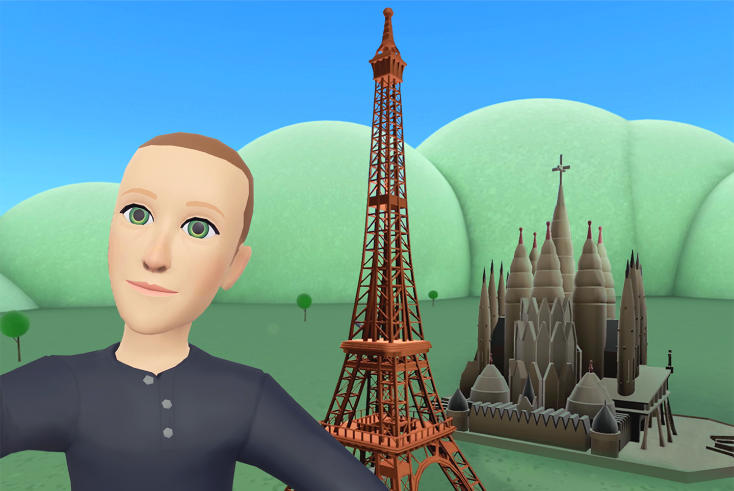Meta’s brand storytelling continues to fail. Here’s why

Opinion
Meta needs a different message—and perhaps even a different narrator—to better communicate its potential.
Remember when Mark Zuckerberg posted that now infamous “selfie” of his avatar posing in front of the Eiffel Tower? He immediately became a viral punching bag, with users mocking the graphical quality of his image to such an extent that he actually felt the need to address it on an investor call.
All to say, it’s easy to critique the Zuck. And much of that criticism is seemingly well deserved… “I know that sometimes when we ship a product, there’s a meme where people say, ‘Hey, you’re spending all this money, and you’ve produced this thing,’ and it’s—I think that that’s not really the right way to think about it.”
Simply put, he isn’t sufficiently focusing on the storytelling aspect—a product drop without meaningful context creates confusion at best, disappointment at worst. He’s making apologies after the fact and that’s the last thing any CEO should be playing at. Headlines asserting that the metaverse is off to “an ominous start” contrast with assertions from Meta’s own chief product officer stating that the metaverse will someday be as “important as the smartphone.” What and who do we believe?
Which is why it’s easy to empathize with continued investor concerns given that Meta has bet big on its namesake and spent more than $100bn (and counting) in research and development as it relates to the metaverse. But with big sums come big expectations. For comparison, Sony spends less than $5bn a year while Apple’s entire annual business expenditure is $22bn.
His forever attempts to reassure investors—and prove all of that R&D investment was well-placed—at Meta’s Connect event last fall fell flat during his hour-long keynote when halfway through, he stepped out of reality and into Horizon World. As his avatar strolled into a virtual theatre to rapturous virtual applause, he simultaneously revealed the latest development milestone in the roadmap of metaverse expansion: avatars in the metaverse now have legs.
But those legs were a calculated misstep doing nothing by way of confidence building or inspiration-driving. They were simply legs—just another feature which achieved nothing in terms of boosting Meta’s brand identity.
As Zuckerberg noted, “legs are hard,” as if to further prove why they should draw attention. And while not a developmental failure per se, they’re a failure of both brand and storytelling.
Hearts and minds
Here’s the problem.
Since its reimagination, Meta has failed to capture the hearts and minds of developers, users and investors alike. It hasn’t gained any ground from a brand standpoint. Yes, it’s a part of our daily lives but few people actually buy into the brand of Meta—or even grasp what it’s seeking to do in the immediate, let alone the future.
In fact, the majority of team members working on metaverse features at Meta don’t understand the direction the business is going, with only 58% of Meta employees stating they understand Zuckerberg’s metaverse ambition. In a memo obtained by reporters from Vishal Shah, Meta’s VP of the metaverse, he described Horizon World’s onboarding experience as “confusing and frustrating.” Shah also said employees working on the app weren’t spending a lot of time on it: “Why don’t we love the product we’ve built so much that we use it all the time?” Shah wrote. “The simple truth is, if we don’t love it, how can we expect our users to love it?”
This is Meta’s problem. But again, it isn’t with its proposition—it’s with its brand and its role in the world.
Infinite potential, poorly conveyed
There isn’t a single aspect of modern life which isn’t becoming increasingly more digital as we move deeper into the 21st Century. The metaverse has all the potential to revolutionize interactions between people, organizations and businesses—in fact, it’s probably fairer to say that it’s a realm of literally infinite potential.
But Meta isn’t authentically or dynamically conveying this potential to users or employees—and that is the biggest misstep thus far. Consider that it built a business with a new name at a time when everyone was (and still is) still trying to figure out what the metaverse is.
Furthermore, a shotgun rebrand from Facebook to Meta to address Facebook’s reputational damage, combined with a series of lacklustre announcements with Zuckerberg as the poster boy, haven’t helped things one bit. Neither are fully capable of defining and expressing the true potential of the metaverse, and they aren’t exciting audiences and investors… and without excitement, what’s the point?
In the not-so-far future, every screen in our lives will be a window into the metaverse, even once we stop calling it that. The Web was evolving towards more three-dimensional, immersive, game-like experiences long before metaverse became a buzzword, and Meta became the name of a global tech company.
The metaverse will increasingly become part of our daily lives as the technology and its design matures, as our adoption of it becomes the norm. It will therefore be a space where—at our fingertips—we can explore the world and its potential. A place where we can explore creativity and what technology can do to make our lives richer and more interesting. You likely won’t spend all day there, but you certainly won’t want to miss out on it either.
Meta has an opportunity to own this change; the chance to give its brand a refresh, an overhaul. No matter what you call it, it needs a different message to drive its brand forward and perhaps even a different narrator—one which can communicate potential in a way which feels authentic and inspiring, as opposed to cold and robotic. One which can properly illustrate the worth of the company that bears its name… before its reputation dives.
Evan Gettinger is executive strategy director at WPP brand and design consultancy Superunion.



